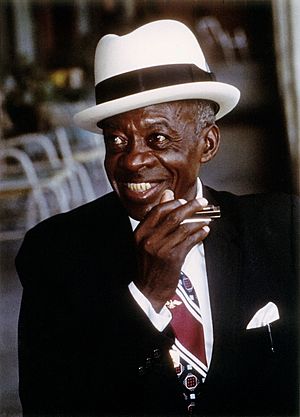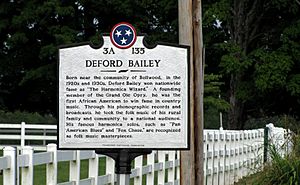DeFord Bailey facts for kids
Quick facts for kids
DeFord Bailey
|
|
|---|---|

Bailey in the 1970s
|
|
| Background information | |
| Born | December 14, 1899 Smith County, Tennessee |
| Died | July 2, 1982 (aged 82) Nashville, Tennessee |
| Genres | |
| Instruments | |
| Years active | 1920s–1941 |
| Labels |
|
DeFord Bailey (born December 14, 1899 – died July 2, 1982) was an American country music and blues star. He was famous from the 1920s until 1941. Bailey made history as the first performer on the Grand Ole Opry. He was also the first African-American artist to perform on the show. Plus, his music was the first ever recorded in Nashville. While he played several instruments, DeFord Bailey was best known for his amazing harmonica skills. People often called him a "Harmonica Wizard."
Born and raised in Tennessee, Bailey learned to play the harmonica when he was a young child. He was recovering from polio at the time. Later, as a teenager, he moved to Nashville. There, he became a very important part of Nashville's growing music scene. He was one of the first entertainers to perform live on the radio. His recorded songs were very popular and well-known.
During the 1930s, Bailey toured and performed with many famous country artists. However, in 1941, he lost his job at Nashville radio station WSM. This happened because of a disagreement over music rights. After that, he stopped making a living as an entertainer. He supported his family by shining shoes and renting out rooms in his home. In 1974, he returned to performing sometimes. He was invited to the Opry's first Old-Timers show. In 2005, after he passed away, he was honored by being added to the Country Music Hall of Fame.
Contents
Early Life and Musical Beginnings
DeFord Bailey was born near Bellwood, Smith County, Tennessee. His grandparents had been slaves. When he was about one year old, his mother died. His aunt, Barbara Lou, then took care of him. At age three, Bailey got polio. This illness kept him in bed for a year. He could only move his head and arms. During this time, he learned to play the harmonica. He copied the sounds of nature around him. He also imitated the sounds of trains passing by.
Bailey did get better from polio, but it changed him. His back remained slightly bent. He only grew to be 4 feet, 10 inches tall. As a teenager, he was so short and thin that train ticket sellers thought he was a child. In 1908, his foster father, Clark Odom, became a farm manager near Nashville. So, the family moved from Smith County. They lived on farms in Nashville and Franklin, Tennessee, for several years. In 1918, the family moved into Nashville city. Clark Odom got a job there. DeFord Bailey then started performing music locally as a hobby.
Becoming a Radio Star
DeFord Bailey first appeared on the radio in September 1925. This was on Fred Exum's WDAD, a Nashville station. His first confirmed shows were in 1926. These included a performance on WDAD on January 14. He also played on WSM on June 19.
On December 10, 1927, he played his famous song, "Pan American Blues." This song was named after a train called the Pan-American. He played it on a show then known as the WSM Barn Dance. This show came on after NBC's classical music program. While introducing Bailey, WSM station manager George D. Hay made a famous announcement. He said, "For the past hour, we have been listening to music largely from Grand Opera, but from now on, we will present ‘The Grand Ole Opry.’" "Pan American Blues" was also the first recorded harmonica blues solo.
Recording Music and Touring
DeFord Bailey released several records in 1927 and 1928. All of them featured his harmonica solos. In 1927, he recorded for Brunswick Records in New York City. In 1928, he made the first recordings ever in Nashville. He recorded eight songs for RCA Victor. Three of these were released on the Victor, Bluebird, and RCA labels. One of his most famous recordings was "John Henry." RCA released this song in two different record series. One was for "race" music, and the other was for "hillbilly" music. This shows how his music appealed to different groups. Besides the harmonica, Bailey also played the guitar, bones, and banjo.
Bailey was one of the first members of the WSM Grand Ole Opry. He was also one of its most popular performers. He appeared on the show from 1927 to 1941. During this time, he toured with big country stars. These included Uncle Dave Macon, Bill Monroe, and Roy Acuff. Like other black stars of his time, he faced challenges while traveling. This was especially true in the Southern United States and Western United States. He had trouble finding places to eat and stay because of unfair Jim Crow laws.
Later Life and Legacy
In 1941, WSM let DeFord Bailey go. This was due to a problem over music licensing. Two groups, BMI and ASCAP, had a disagreement. This meant Bailey could not play his most famous songs on the radio. When he left the Opry, his performing and recording career basically ended.
After that, Bailey spent the rest of his life running his own shoeshine stand. He also rented out rooms in his home to earn money. He kept playing the harmonica, but he almost never performed for the public. One rare performance happened in 1974. He agreed to appear on the Opry. This was a special event as the Opry moved from the Ryman Auditorium to the Grand Ole Opry House. This performance led to the Opry's yearly Old Timers' Shows.
Bailey continued to play at the Opry sometimes. He performed there on his 75th birthday in December 1974. He also played at the Old Timers Shows and in April 1982. A few months later, in June, he became very ill. He was taken to Nashville's Baptist Hospital. DeFord Bailey died on July 2, 1982, at his daughter's home in Nashville. He is buried in Greenwood Cemetery.
Influence and Honors
DeFord Bailey said he came from a tradition of "black hillbilly music." His family members played many instruments. His grandfather was a well-known fiddler in Smith County, Tennessee. Bailey once said about learning the harmonica: "Oh, I wore it out trying to imitate everything I hear! Hens, foxes, hounds, turkeys, and all those trains and things on the road. Everything around me."
He performed classic songs like "Cow-Cow Blues." Bailey also wrote his own famous Opry songs. These included the train-sounding "Pan American Blues" and "Dixie Flyer Blues." When WSM's radio power grew stronger, Bailey's influence also grew. Harmonica fans listened to his performances and studied his recordings.
In 2005, Nashville Public Television made a documentary about him. It was called DeFord Bailey: A Legend Lost. This documentary was shown across the country on PBS. DeFord Bailey was inducted into the Country Music Hall of Fame on November 15, 2005. The DeFord Bailey Tribute Garden was opened on June 27, 2007. It is located at the George Washington Carver Food Park in Nashville. The Encyclopedia of Country Music called him "the most significant black country star before World War II." Even decades after his death, DeFord Bailey is still remembered as a 'Harmonica Wizard.'
Discography
78 rpm singles
- "Evening Prayer Blues" / "Alcoholic Blues" (Brunswick, 1927)
- "Muscle Shoal Blues" / "Up Country Blues" (Brunswick, 1927)
- "Dixie Flyer Blues" / "Pan American Blues" (Brunswick, 1927)
- "Fox Chase" / "Old Hen Cackle" (Vocalion, 1928)
- "Ice Water Blues" / "Davidson County Blues" (Victor, 1929)
- "John Henry" / "Like I Want To Be" (split single with Noah Lewis) (Victor, 1932)
- "John Henry" / "Chester Blues" (split single with D. H. Bilbro) (Victor, 1933)
Albums
- The Legendary DeFord Bailey (Tennessee Folklore Society, 1998) (recorded 1974–1976)
 | DeHart Hubbard |
 | Wilma Rudolph |
 | Jesse Owens |
 | Jackie Joyner-Kersee |
 | Major Taylor |


